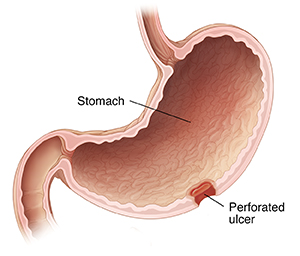Understanding Perforated Ulcers
A peptic ulcer is an open sore in the stomach lining or the upper part of the small intestine (duodenum). An ulcer can go through all the layers of the digestive tract and form a hole (perforation). This is called a perforated ulcer. A perforated ulcer lets food and digestive juices leak out of the digestive tract. This is a serious health problem that needs urgent medical attention.

What causes perforated ulcers?
A hole will form if peptic ulcers go untreated. To find the cause of your ulcer, your healthcare provider will give you an exam and review your health history. They may also order tests. The main causes of peptic ulcers include:
-
Infection with the H. pylori (Helicobacter pylori) bacteria. This damages the stomach lining. Digestive juices can then harm the digestive tract.
-
Long-term use of some over-the-counter pain medicines such as NSAIDs (non-steroidal anti-inflammatory drugs). These include ibuprofen, naproxen, and aspirin. This makes stomach or intestinal damage more likely.
Symptoms of a perforated ulcer
Symptoms of a perforated ulcer may include:
-
Sudden, severe pain in the belly (abdomen), usually in the upper abdomen
-
Pain spreading to the back or shoulder
-
Upset stomach (nausea) or vomiting
-
Lack of appetite or feeling full
-
Swollen belly or feeling bloated
Treatment for a perforated ulcer
Treatment for a perforated ulcer starts with fixing the hole in your digestive tract. This may be done with surgery.
Other treatments are aimed at easing pain and removing the cause of the ulcer. Prescription medicines may help with the following:
Your provider may also give you different medicines if your ulcer was caused by over-the-counter pain medicines. In some cases, you may not have another choice. But, check with your healthcare provider to see what's best for you.
Possible complications of a perforated ulcer
Perforated ulcers can have serious complications. These include:
When to call your healthcare provider
Call your healthcare provider right away if you have any of these:
-
Vomiting blood, or vomit that looks like coffee grounds
-
Bloody, black, or tarry-looking stools
-
Fever of 100.4°F (38°C) or higher, or as directed by your provider
-
Chills
-
Pain that gets worse
-
Symptoms that don’t get better with treatment, or symptoms that get worse
-
New symptoms